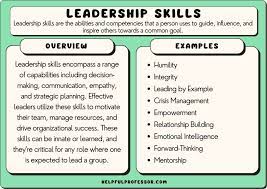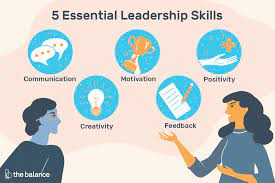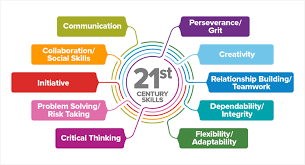Developing Essential Team Leader Skills
Effective team leaders play a crucial role in the success of any organization. They are responsible for guiding their team members toward common goals, fostering collaboration, and ensuring productivity. To excel in this role, team leaders must possess a diverse set of skills that enable them to lead with confidence and inspire their teams to perform at their best.
Communication Skills
One of the most important skills for a team leader is effective communication. Clear and open communication helps in setting expectations, providing feedback, resolving conflicts, and keeping team members motivated. A good team leader listens actively, articulates ideas clearly, and ensures that everyone understands their roles and responsibilities.
Problem-Solving Abilities
Team leaders often encounter challenges and obstacles that require quick thinking and strategic problem-solving skills. Being able to analyze situations, identify root causes of issues, and develop solutions is essential for maintaining team momentum and achieving objectives efficiently.
Emotional Intelligence
Emotional intelligence is another key trait of successful team leaders. Understanding and managing one’s emotions as well as recognizing and empathizing with the emotions of others can help build trust, strengthen relationships, and create a positive work environment. Team leaders with high emotional intelligence can navigate conflicts effectively and foster a supportive team culture.
Decision-Making Skills
Team leaders are often required to make tough decisions under pressure. Strong decision-making skills involve weighing options carefully, considering potential outcomes, consulting with team members when necessary, and taking decisive action when needed. Making informed decisions contributes to the overall success of the team.
Adaptability
In today’s fast-paced work environment, adaptability is a valuable skill for team leaders. Being able to adjust to changing circumstances, embrace new technologies or methodologies, and pivot strategies as needed ensures that the team remains agile and responsive to evolving challenges.
Conclusion
In conclusion, developing essential team leader skills is vital for individuals aspiring to lead teams effectively. By honing communication abilities, problem-solving techniques, emotional intelligence, decision-making prowess, and adaptability, aspiring team leaders can enhance their leadership capabilities and drive their teams toward success.
Essential Team Leadership Skills: Roles, Qualities, and Effective Strategies for Success
- What skills are needed to be a team leader?
- What is the 3 important roles of a team leader?
- What are the 7 skills of effective leadership?
- What are the qualities of a team leader?
What skills are needed to be a team leader?
To be an effective team leader, a diverse set of skills is essential. Communication skills are paramount, as clear and open communication is key to setting expectations, providing feedback, resolving conflicts, and keeping team members motivated. Problem-solving abilities are crucial for addressing challenges efficiently and maintaining team momentum. Emotional intelligence plays a significant role in building trust, managing relationships, and creating a positive work environment. Strong decision-making skills are necessary for making informed choices under pressure, while adaptability ensures the team can navigate changing circumstances effectively. Overall, a successful team leader combines these skills to inspire their team and drive collective success.
What is the 3 important roles of a team leader?
The three important roles of a team leader encompass guiding the team towards common goals, fostering collaboration among team members, and ensuring productivity and efficiency within the team. Firstly, a team leader serves as a guiding force by setting clear objectives, providing direction, and motivating team members to work towards achieving shared targets. Secondly, they play a pivotal role in promoting collaboration by encouraging open communication, resolving conflicts constructively, and leveraging the diverse skills and perspectives of team members to drive innovation. Lastly, a team leader is responsible for optimizing productivity by delegating tasks effectively, providing necessary resources and support, and monitoring progress to ensure that the team operates efficiently and achieves desired outcomes.
What are the 7 skills of effective leadership?
When it comes to effective leadership, there are seven key skills that are often highlighted as essential for success. These skills include strong communication abilities to convey ideas clearly and foster collaboration, strategic problem-solving capabilities to address challenges efficiently, emotional intelligence to understand and manage emotions effectively, decision-making skills to make informed choices under pressure, adaptability to navigate changing circumstances with ease, empathy to build strong relationships and trust within the team, and a vision for the future to inspire and guide team members toward common goals. Mastering these seven skills can empower leaders to lead their teams with confidence and achieve desired outcomes.
What are the qualities of a team leader?
When exploring the qualities of a team leader, several key attributes come to light. A successful team leader demonstrates strong communication skills, fostering open dialogue and ensuring clarity among team members. Additionally, effective problem-solving abilities enable a team leader to navigate challenges and guide the team toward solutions. Emotional intelligence plays a crucial role in understanding and managing emotions within the team, building trust, and fostering a positive work environment. Decisiveness in decision-making is essential for guiding the team forward with confidence and direction. Lastly, adaptability allows a team leader to respond to changing circumstances and lead the team through various challenges with flexibility and resilience. Combined, these qualities form the foundation of a capable and inspiring team leader.




